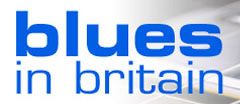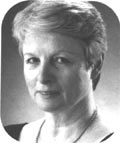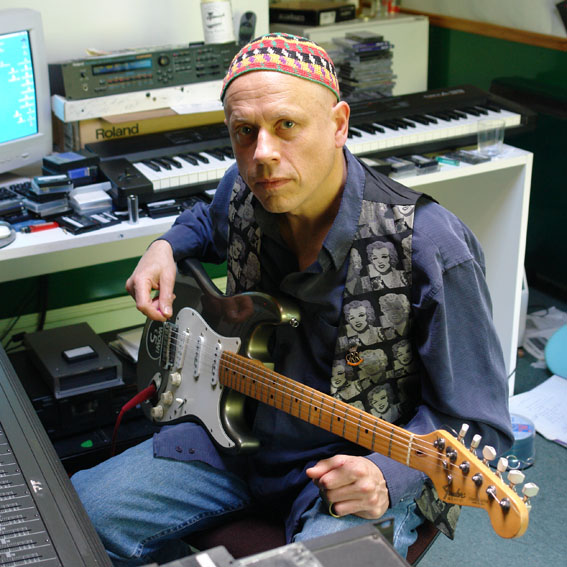
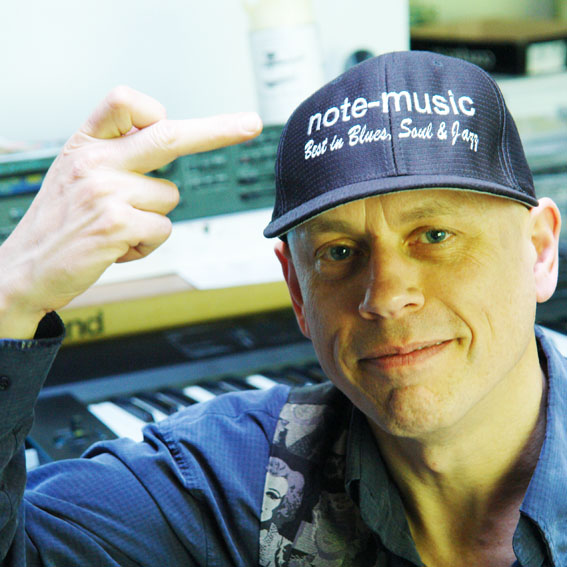
Special Guests on Mojo Include:
Clive Alive - David Andersen - Robin Bibi - Andy Cortes - Paul Cox - Kit Hain - Pauline Henry - Bob Jenkins - Errol Linton - Ron Margolis - Dan Moretti - Fuzzbee Morse - Owen Plant - Daya Rawat - Natalia Roni - Jackie Rawe - Kellie Rucker - Pete Saunders - Noel Tapper - Luke Tunney - Lucille Wall - Peetah -
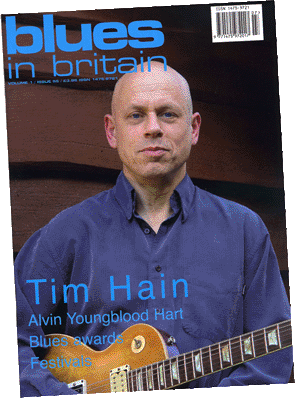
BLUES IN BRITAIN - July 2006
Tim Hain is a guitarist, singer, band leader and songwriter who combines the genres of blues and reggae. His new album for Note Records is called One Man Went To Mojo. Tim came in to Blues In Britain to talk to Fran Leslie. The photo is by Blake Powell.
It took many hours, months, years, sitting in my converted garage, sometimes by myself, sometimes with other musicians. It's mainly my own material, about sixty to seventy per cent, with a few well chosen covers, which illustrates the musical genre that a Paris radio station feels that I discovered. They say on their web site, It feels like it has always been around, waiting for Tim Hain to discover it.'
It was a lovely thing to read on their web page as the songs on the album were at one, two and six on their chart. One of my friends, on hearing our version of "The Wind Cries Mary", sat back in his chair and beamed, and said to me, 'Congratulations! You've invented bleggae!' This is a term we've decided to use. The radio says 'Tim Hain, bringing you the best of blues and bleggae', which is quite fun.
The overall feel of the album is derived from years of playing live, which is why I included "Wind Cries Mary", which fulfils my Jimi Hendrix finally meets Bob Marley in Heaven fantasy; "Need Your Love So Bad" with a reggae feel which Paul Jones has played and really liked; an Albert King song, "Down Don't Bother Me"; a remake of the old Stephen Stills' Buffalo Springfield song "For What It's Worth". There is a tactical reason for putting these on, apart from the fact that I love the tracks, which is because anybody who doesn't know me, say a radio person, picks up the CD and goes, 'oh I know that song.' It's a hook they can identify with.
The album features four reggae drummers, primarily two: Leroy who has backed such people as Lee Scratch Perry and Frankie Pool and Michael Rose of Black Uhuru. The drummer currently known as Prince, as I like to introduce him, who has toured with a couple of reggae bands; a guy called Tapper - that is his real surname - who plays for people like Gregory Isaacs when he's in England. Then we've got one track with Bob Jenkins from Be S#arp. They provide the backbone of the album with Roy Parsons and Pete Shaw and myself doing bass. There are many guest appearances from friends. There wasn't really room to get them all on.
There are guitarists Andy Cortes and Robin Bibi, harmonica players; Errol Linton plays on the opening track. He did more than just play. He took a train ride out to my house in Surrey, walked in the studio and performed. It was a brilliant evening.
Then there's my friend Kellie Rucker, who plays mad harmonica on this last live track. She's played with all sorts of people, John Lee Hooker, Albert King. She's four foot nothing, very slim white girl. You wouldn't believe her. If she turned sideways, you'd mark her absent. She turns up with a harp and a Fender Twin and she's huge, great fun. She's based in Florida.
We have different backing singers. I do a duet with Clea Llewellyn who has her own trip hop band called Mouli, which is already starting to get some airplay from Tom Robinson. That is a bleggae version of "Misty Blue" I have found the people on the English blues scene very supportive. People have been very kind in terms of helping one out, giving one gigs and putting one in touch with gigs. People like Papa George and Robin Bibi who have never held back with contacts or invitations to sit in. (They are) Just great people earning a living playing music. It's an honour to be able to associate with them.
I've divided the album into two parts. The first part I've called Reality Check. It includes my first child's cry when she was ten minutes old, in a song called "Fine Time Child". It describes my fears of bringing any child into this planet, at this age; had I resolved my own childhood drama? Somebody said to me, 'The fact that you even worry about these things shows that you probably have the ability to bring it through. There's a song called "Somebody Turn On A Light" which is about real life encounters with people in shameful circumstances; how low can humanity go? "If I Ever Get Home" is about an unknown soldier in Iraq and there's my little reggae rant "Welcome to Iraq". So the first half has that kind of feel to it. The second half, I call One Scotch, One Bourbon, One Beer, in honour of the great blues man. Its slightly more concentrated blues but slightly more fun, slightly lighter. That's the light and shade. "An Old Bluesman Never Dies" is a tribute to John Lee Hooker.
The title track came about because I was talking to Lucy, my other half, about what fun it would be to do a reggae version of "One Man Went To Mow" an had this photograph of me pushing a lawn mower at the age of three. I felt that would make a nice cover. She said, 'Why don't you do "One Man Went To Mojo"? I thought that was a good idea. So we did this slightly New Orleans-ish version of this old English folk song. I sang a guide vocal and I was just singing gobble-dee-gook at one point, sort of making it up as I went along. I listened to it back and I thought, 'I want to keep a lot of that, gobble-dee-gook and all!' In music one walks a constant line between something that is recognisable, a form that is in tact and leaving enough room as Stevie Wonder said, during the making of Songs In The Key of Life, 'leave room for God to walk through the studio,' or in this case the stage. In other words leave room for the unexpected to happen. Don't be afraid of uncertainty, of being on the edge because that's what makes it exciting, makes it real.
My introduction to the blues was anything but Deep South (of the USA); more like deep South England, at a traditional English public school, Bryanston, where we privileged prisoners found our escape in the cry of the blues guitar. On a Sunday afternoon, you could walk around this vast old building and from every window you could hear a different solo of Eric's, from a different track of the John Mayal! & The Bluesbreakers Beano album, followed by "Red House" by Hendrix, and, as we educated ourselves, Live At The Regal. I formed my first band with a rebel friend, John Wood. I remember him sneaking me off to Salisbury to see Chicken Shack.
I always loved blues as a kid, as a spotty school boy, I was totally captivated by the sound of Eric Clapton and then Peter Green and then all the people who influenced them. So I found myself at The Fishmongers Arms, Finsbury Park, seeing Freddy King, backed by Steam some university in London as well. I saw Hendrix. There was Cream's first gig at Woking Town Hall. I saw Led Zeppelin's first gig at The Marquee. I saw Fleetwood Mac's first gig at Windsor Jazz & Blues Festival. I saw Derek & The Dominoes' first gig, right there back in the day.I don't know what happened to my musical tastes. They all got mashed up horribly.
Then in the mid-eighties, I got hired to play lead guitar for many visiting reggae artists. Those reggae bass lines stuck. Somehow they became hypnotic. When it became necessary for me to earn a living, when I started gigging eight, ten years ago, the most natural music for me to do was blues with a reggae feel. It just naturally seemed to come together for me.
One of my roles was touring with The Black Theatre Co-op and I was always introduced by their MD 'Dis is Tim. He's our token white!' That kind of stuck, stuck very naturally and those reggae bass lines became as hypnotic as those Freddy King licks. Plus, as I have discovered, the great thing about blues and reggae is what they have in common. To the purist, from a musical point of view, perhaps they have nothing in common. To me, music is more than just form and chords. Music is a feeling and a particular music is something that is born of ertain culture, certain social conditions. Therefore, blues and reggae are both musical forms that originate, generally speaking, in impoverished social conditions and yet in their expression they bring about joy and dance. Or, as John Lee Hooker said, 'the blues is a healer!' and that really is true. I find that is the link between them, first of all.
Second of all, they both have incredibly simple structures. Reggae is built on two chords and one bass line. Blues is often similar. We have the famous 'three chord trick' that everybody talks about. Therefore you have a very simple language. In each case, surely, it evolved simply because the people didn't have the luxury of rehearsal, so they needed alanguage so the could say, 'I've got a new tune, which I learnt today. Follow me!'
Much of my major education took place in a year I had to spend in America, in 1994-95. I ended up sitting in with the best musicians in San Francisco and Atlanta. I distinctly remember seeing this visiting blues artist with a pick up band in Oakland and they sounded fantastic. But here was the guy, holding the harmonica with one hand and holding up the other hand with either one finger, or four fingers or five fingers, with his left hand so the band knew what the next chord was. It was seamless!
It is quite important for me to have two of everything, two bass players, two drummers whatever, because, if people are good, they are busy. You can't rely on them, necessarily, to be available. I remember a time when somebody came up to me, after a gig with a bass player and a drummer who had never met, and said 'Mate, you band's wicked. It's really tight! How long have you guys been together?' I looked at my watch and said, 'Since about nine o'clock.' That's the way it is; it's a universal language. So these for me are the links, both musically and sociologically, between blues and reggae. When Al Anderson joined The Wailers, he asked Bob (Marley), 'what do you want me to play?' Bob said 'just play the blues, man!'
It lends a distinctive edge to one's phrasing over that particular rhythm. I enjoy it and it seems to uplift people and it uplifts me. There are many times when I have gone into a gig, perhaps with an aching shoulder or with flu coming on, then I'm half way through my journey home and suddenly realise mysymptoms have totally disappeared. In the process you get healed.
On that same theme, coming back to Eric Clapton and Peter Green. Peter Green was a very pure blues man who once said, 'I'm afraid I sound more like B. B. King than B. B. King.' Certainly B. B. King had great respect for Peter Green; Eric Clapton certainly made the British public aware of blues. And yet they also went on to embrace another ethic, which went on to combine with the feeling that comes from blues, hence, we had, from both Eric Clapton and Peter Green, some of the most beautiful and well constructed songs ever written. "Man Of The World", what a beautiful song that is by any standards and yet knowing Peter Green, you can see how that evolved from blues. "Layla', "I Looked Away", "In My Father's Eyes", "The Circus Left Town", a lot of really beautiful songs that Eric Clapton has written, yet he can still come back and do a great blues revival album, From The Cradle.
The fact that a guy can go on to be such a great craftsman and still show his roots, like that, is wonderful. All my favourite guitarists have great technical fluency, like Jeff Beck and Jimi Hendrix, yet they can still play, as George Harrison said, 'that one note that makes you cry. That's what makes a guy great, not technical fluency but feel. When a guy has musical fluency and can still move you, that's what counts. As Albert King said to Stevie Ray on that album they did together, 'so many people, they got speed but they got no soul, but, brother, you've got both!'
You probably remember a song in the sixties, by the Bonzo Dog Doodah Band, called "Can Blue Men Sing The Whites (or are they hypocrites?)" and it has that famous line in it, 'Ain't gonna shave cos I'm gonna play the blues
tonight'. Certainly, in the sixties, although you had your 'greats' - and Fleetwood Mac always used to take the piss as well although their music was in essence was great and they were really serious about it - but there was this stony faced, English, white blues persona. When you saw the real thing in person, the originators, they always had a calm, a dignity about them as in 'listen, I've been through this shit and I can smile about it!' which is very uplifting. That's where it touches you, and you think, if this guy can strum my pain with his fingers but at the same time wear a smile that says ok boy, you can get over it', that makes it a very powerful and uplifting form. There's a difference between the blues as an ethic, as an expression of the human soul, a bandwagon that people jump on and kind of miss the point. It's an important distinction to make. The peote who have touched us, do so on a feeling level not because they can reproduce solos note for note.
However, the best example I ever saw of this note-for-note business was in Atlanta. Every Sunday, the top session musicians would meet at a gig; they'd invite me down as well. One particular thing they did was when a local guitarist and a local award-winning keyboard play would play "Crossroads" solo (Eric Clapton style), in unison, note for note. The next Sunday I came along, there was a second guitarist, so there were three of them all playing the "Crossroads" solo, note for note, with big grins on their faces. They even cocked their heads inunison. They were definitely taking the piss, very professionally, but it was very funny. Musically it was brilliant! It sounded like Eric Clapton, triple tracked, but it was definitely tongue in cheek.
In my formative year in the States, often someone would say, 'get him up for a number'. waqq1At the end they'd say, 'do you wanna stay for the rest of the set?' or 'Can you come again, next Sunday, as well?' I worked in San Francisco. I did a couple of gigs and some writing and a lot of hanging our with John Lee Hooker's daughter Zakiya and that was great fun. We had a lovely time. She was very happy to have me sit in on a few gigs and I'd love to see her again one of these days. he was very small in stature but I found her large in personality and warmth. I've had a lot of encouragement, when I was in America and over here, in the blues network family. There's been more encouragement than ompetition, I'm glad to say. That must speak for musicianship because if you are good, you don't need to prove it, just be yourself.
You were talking about the blues etiquette of always inviting musicians in the audience. I turned up to a gig in the wilds of Kent and on the way down I discovered on the way down that Jeff Beck was likely gonna look in. During the first set, this super-star comes in, skulking behind the bass amp. I'm thinking, 'oh my God, Jeff Beck is in the house. I'd better not play any guitar, just play some two-chord reggae things,' but of course, you forget; the enthusiasm takes a over. Halfway through, this woman says, 'He wants to meet you. He really loves your playing!' So I went over and he shook my hand warmly, and he says, 'I love all that Albert Collins, Albert King stuff you're doing man!' We had a good old chat. I said, 'Look I heard you might be coming so I have a spare amp and guitar if you want.' He said, 'Well man, it's the expectation, you know, I've been working hard ll day...' You could see the superstar thing sitting on his shoulders quite heavily.
But you could also see the fourteen-year-old who picked up the guitar for the first time and was still alive and well also. Anyway, we had a good chat. At the beginning of the second set, I had one of those radio things, where you could walk around anywhere you want. So we started the second set, suitably relaxed, on the advice and invitation of the landlord. When we were playing our first tune, I said to the band, 'I'll see you later!' and wandered into the crowd to where Jeff Beck and his friends, who happened to include Vic Reeves and girl friends, all sitting around. Jeff takes one look at my guitar and says, 'My God! What year is that?' I said, 'It's a sixty-six. Here have a go.' So I just stick it in his lap and he goes, 'Oh great!' and starts playing away. The band, at the other end of the pub, has no idea they are playing with Jeff Beck. Then he hands it back to me, very deliberately, so I start entertaining all the guys at his table and he's loving it. Then I hand it back to him. Next thing you know, the pair of us are playing my guitar. I'm playing the top two strings; he's playing the bottom four and we are just like two kids, with grins on our faces. All of the sudden I get a reality check and I look around at all these people standing around with their jaws dropped. We're just two kids having fun. God bless him, he stayed all night and left bout one in the morning, we were still playing, with compliments for everybody. I probably played my best that night, again, not from a sense of competition or trying to prove myself, just as a sense of saying thank you to this guy who was a major inspiration to me. Now it was my turn to say, 'OK Jeff, let me entertain you!'
It's elation and it's gratitude as well. That's a great feeling to have when you play to anyone, because Jeff Beck, in one sense, is a superstar and in another sense he's a human being who goes through the same emotions you and I do, loves to be entertained, loves to relax, loves to enjoy life. If you can facilitate that in anybody, you usually find yourself benefiting at the same time. That I suppose is the basic philosophy behind why I play music, apart from the fact that it is the only way left to me to earn a living. The two things go hand in hand, I think, the love of it and the need to make a living. Let's say it is 51% love and 49% business and it has to be in that order because, providing you are loving it, you will get rebooked.
FRAN LESLIE - Blues In Britain
Tim Hain & Sunnyside Up: One Man Went To Mojo (Note Records NCD 10092)
www.timhain.com
www.note-music.co.uk
The album launch was at...
The Dover Street Restaurant & Bar,
8 - 10 Dover Street, London W1,
Monday 10th July,
